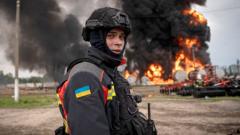In a significant display of discord, the United States opposed a European-backed resolution at the U.N. demanding Russia's withdrawal from Ukraine, signaling a pivotal shift in U.S. foreign policy under the Trump administration.
### U.S. and European Allies Clash at U.N. on Ukraine Resolution

### U.S. and European Allies Clash at U.N. on Ukraine Resolution
A divergent stance from the U.S. creates notable tensions with European allies regarding Russian aggression in Ukraine.
February 24, 2025 marks the third anniversary of Russia's full-scale invasion of Ukraine, yet tensions within the West are revealing themselves in unexpectedly stark terms. At the most recent U.N. General Assembly, the U.S. voted against a resolution led by Ukraine that sought to condemn Russia's actions and called for their immediate withdrawal from Ukrainian territory. Instead, the Trump administration introduced a more conciliatory resolution that merely urged an end to hostilities without assigning blame or calling for accountability for Russian aggression.
While the Ukrainian resolution was comprehensive, addressing the need for a "comprehensive, lasting and just peace" as well as accountability for war crimes, the U.S. resolution was minimalistic, lacking any reference to Russia's military actions. This decision marks a dramatic departure from previous U.S. positions that typically aligned more closely with European nations to confront the security threats posed by Russia.
The backdrop to this U.N. confrontation includes President Trump’s recent comments labeling Ukrainian President Volodymyr Zelensky as a "dictator" and erroneously claiming that Ukraine instigated the war, further complicating America's diplomatic narrative. The outcome of this standoff not only underscores a rift within Western allies but also raises questions about the future dynamics of international responses to the ongoing conflict in Ukraine.
While the Ukrainian resolution was comprehensive, addressing the need for a "comprehensive, lasting and just peace" as well as accountability for war crimes, the U.S. resolution was minimalistic, lacking any reference to Russia's military actions. This decision marks a dramatic departure from previous U.S. positions that typically aligned more closely with European nations to confront the security threats posed by Russia.
The backdrop to this U.N. confrontation includes President Trump’s recent comments labeling Ukrainian President Volodymyr Zelensky as a "dictator" and erroneously claiming that Ukraine instigated the war, further complicating America's diplomatic narrative. The outcome of this standoff not only underscores a rift within Western allies but also raises questions about the future dynamics of international responses to the ongoing conflict in Ukraine.




















